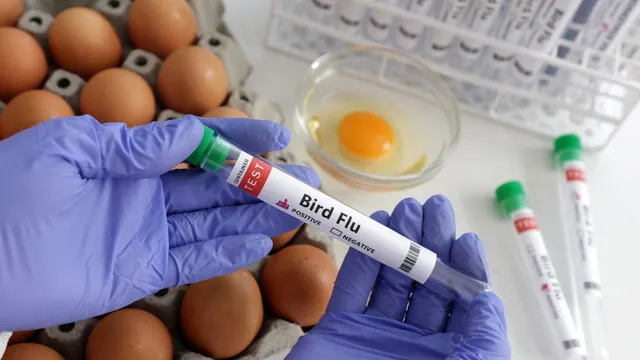- By Shivangi Sharma
- Sat, 15 Nov 2025 10:41 PM (IST)
- Source:JND
The United States has reported its first human case of the H5N5 bird flu strain, a variant never before seen in humans, raising fresh public health concerns even as authorities emphasise that the overall risk to the general population remains low.
The patient, an elderly resident of Grey's Harbour County, Washington, has been hospitalised since early November and is said to have underlying medical conditions. Health officials have not confirmed the exact source of infection but suspect exposure to backyard poultry, a common risk pathway during the winter migration season when avian influenza transmission typically increases.
According to the US Centres for Disease Control and Prevention (CDC), H5N5 has circulated in wild birds for years, but this marks its first known jump into a human. Bird flu can spread through an infected animal’s saliva, mucus, faeces, or raw milk from dairy cattle, putting people who work closely with livestock at increased risk.
The ongoing US bird flu outbreak, which began in January 2022, has displayed unusually high transmission among mammals, far more than in previous years, but no evidence of human-to-human transmission has emerged so far.
Contact Tracing Underway In Washington
State health authorities have launched contact tracing to monitor people who may have interacted closely with the infected individual. Those identified are being advised to watch for symptoms and undergo testing if needed. Both the CDC and Washington’s Department of Health reiterate that the current public risk is low, but experts caution that the virus must be closely monitored.
Dr. Richard Webby, an influenza specialist, warned that the pathogen carries clear “pandemic potential”, a reminder of why surveillance remains critical even with isolated cases.
Precautions For High-Risk Groups
People who handle poultry, cattle, or wildlife, including farmers, veterinarians, and backyard flock owners, are strongly urged to take precautions such as wearing gloves, masks, eye protection, and fluid-resistant outerwear.
Officials advise those with backyard poultry to avoid contact with sick or dead birds and report unusual illness immediately to the Washington State Department of Agriculture. Veterinarians must similarly report suspected infections among domestic animals.
Safety Guidelines For The Public
Health agencies recommend several preventive measures:
Wear gloves and disinfect areas exposed to bird faeces (1 part bleach to 10 parts water).
Use masks and gloves when disposing of dead birds; double-bag carcasses before discarding.
Wash your hands thoroughly after cleanup.
Avoid consuming raw milk, raw cheese, or undercooked poultry.
Avoid contact with sick or dead wildlife and report detections to local authorities.
While the case has triggered heightened surveillance, experts stress that prompt reporting, personal protection, and cautious handling of animals remain key to preventing further spread of the H5N5 strain.
ALSO READ: Jaishankar Chairs Key Diplomatic Meet In New York, Calls For Stronger India–US Engagement

